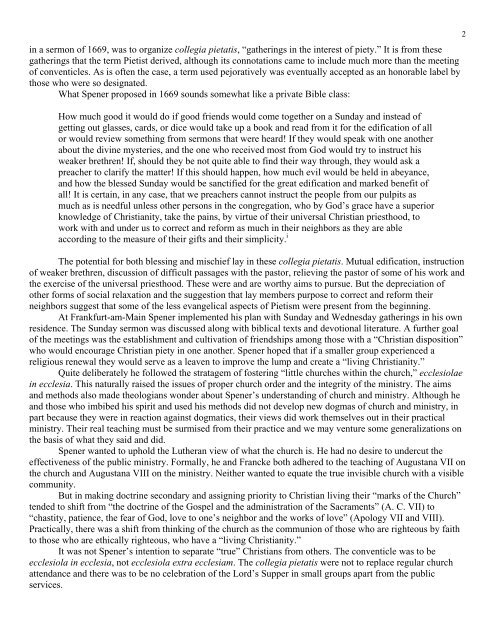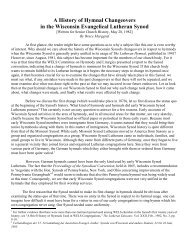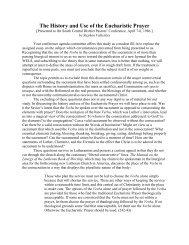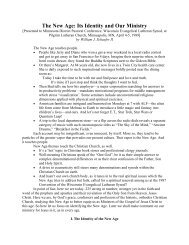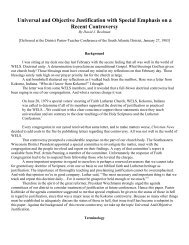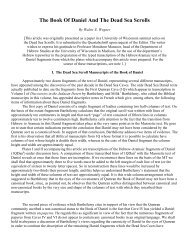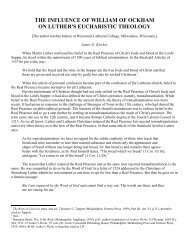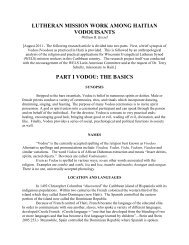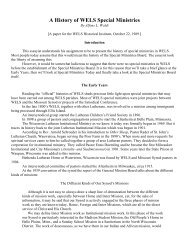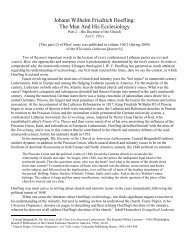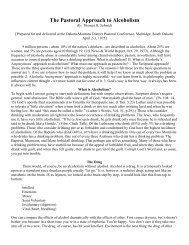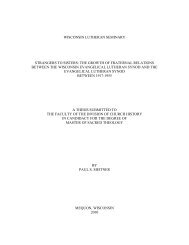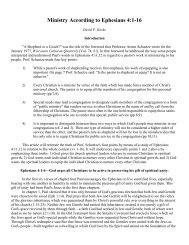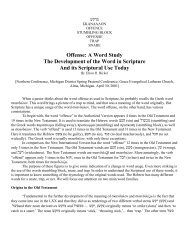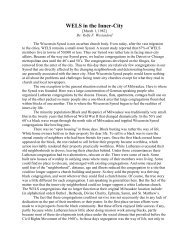Pietism's Teaching on Church and Ministry - Wisconsin Lutheran ...
Pietism's Teaching on Church and Ministry - Wisconsin Lutheran ...
Pietism's Teaching on Church and Ministry - Wisconsin Lutheran ...
Create successful ePaper yourself
Turn your PDF publications into a flip-book with our unique Google optimized e-Paper software.
in a serm<strong>on</strong> of 1669, was to organize collegia pietatis, “gatherings in the interest of piety.” It is from these<br />
gatherings that the term Pietist derived, although its c<strong>on</strong>notati<strong>on</strong>s came to include much more than the meeting<br />
of c<strong>on</strong>venticles. As is often the case, a term used pejoratively was eventually accepted as an h<strong>on</strong>orable label by<br />
those who were so designated.<br />
What Spener proposed in 1669 sounds somewhat like a private Bible class:<br />
How much good it would do if good friends would come together <strong>on</strong> a Sunday <strong>and</strong> instead of<br />
getting out glasses, cards, or dice would take up a book <strong>and</strong> read from it for the edificati<strong>on</strong> of all<br />
or would review something from serm<strong>on</strong>s that were heard! If they would speak with <strong>on</strong>e another<br />
about the divine mysteries, <strong>and</strong> the <strong>on</strong>e who received most from God would try to instruct his<br />
weaker brethren! If, should they be not quite able to find their way through, they would ask a<br />
preacher to clarify the matter! If this should happen, how much evil would be held in abeyance,<br />
<strong>and</strong> how the blessed Sunday would be sanctified for the great edificati<strong>on</strong> <strong>and</strong> marked benefit of<br />
all! It is certain, in any case, that we preachers cannot instruct the people from our pulpits as<br />
much as is needful unless other pers<strong>on</strong>s in the c<strong>on</strong>gregati<strong>on</strong>, who by God’s grace have a superior<br />
knowledge of Christianity, take the pains, by virtue of their universal Christian priesthood, to<br />
work with <strong>and</strong> under us to correct <strong>and</strong> reform as much in their neighbors as they are able<br />
according to the measure of their gifts <strong>and</strong> their simplicity. i<br />
The potential for both blessing <strong>and</strong> mischief lay in these collegia pietatis. Mutual edificati<strong>on</strong>, instructi<strong>on</strong><br />
of weaker brethren, discussi<strong>on</strong> of difficult passages with the pastor, relieving the pastor of some of his work <strong>and</strong><br />
the exercise of the universal priesthood. These were <strong>and</strong> are worthy aims to pursue. But the depreciati<strong>on</strong> of<br />
other forms of social relaxati<strong>on</strong> <strong>and</strong> the suggesti<strong>on</strong> that lay members purpose to correct <strong>and</strong> reform their<br />
neighbors suggest that some of the less evangelical aspects of Pietism were present from the beginning.<br />
At Frankfurt-am-Main Spener implemented his plan with Sunday <strong>and</strong> Wednesday gatherings in his own<br />
residence. The Sunday serm<strong>on</strong> was discussed al<strong>on</strong>g with biblical texts <strong>and</strong> devoti<strong>on</strong>al literature. A further goal<br />
of the meetings was the establishment <strong>and</strong> cultivati<strong>on</strong> of friendships am<strong>on</strong>g those with a “Christian dispositi<strong>on</strong>”<br />
who would encourage Christian piety in <strong>on</strong>e another. Spener hoped that if a smaller group experienced a<br />
religious renewal they would serve as a leaven to improve the lump <strong>and</strong> create a “living Christianity.”<br />
Quite deliberately he followed the stratagem of fostering “little churches within the church,” ecclesiolae<br />
in ecclesia. This naturally raised the issues of proper church order <strong>and</strong> the integrity of the ministry. The aims<br />
<strong>and</strong> methods also made theologians w<strong>on</strong>der about Spener’s underst<strong>and</strong>ing of church <strong>and</strong> ministry. Although he<br />
<strong>and</strong> those who imbibed his spirit <strong>and</strong> used his methods did not develop new dogmas of church <strong>and</strong> ministry, in<br />
part because they were in reacti<strong>on</strong> against dogmatics, their views did work themselves out in their practical<br />
ministry. Their real teaching must be surmised from their practice <strong>and</strong> we may venture some generalizati<strong>on</strong>s <strong>on</strong><br />
the basis of what they said <strong>and</strong> did.<br />
Spener wanted to uphold the <strong>Lutheran</strong> view of what the church is. He had no desire to undercut the<br />
effectiveness of the public ministry. Formally, he <strong>and</strong> Francke both adhered to the teaching of Augustana VII <strong>on</strong><br />
the church <strong>and</strong> Augustana VIII <strong>on</strong> the ministry. Neither wanted to equate the true invisible church with a visible<br />
community.<br />
But in making doctrine sec<strong>on</strong>dary <strong>and</strong> assigning priority to Christian living their “marks of the <strong>Church</strong>”<br />
tended to shift from “the doctrine of the Gospel <strong>and</strong> the administrati<strong>on</strong> of the Sacraments” (A. C. VII) to<br />
“chastity, patience, the fear of God, love to <strong>on</strong>e’s neighbor <strong>and</strong> the works of love” (Apology VII <strong>and</strong> VIII).<br />
Practically, there was a shift from thinking of the church as the communi<strong>on</strong> of those who are righteous by faith<br />
to those who are ethically righteous, who have a “living Christianity.”<br />
It was not Spener’s intenti<strong>on</strong> to separate “true” Christians from others. The c<strong>on</strong>venticle was to be<br />
ecclesiola in ecclesia, not ecclesiola extra ecclesiam. The collegia pietatis were not to replace regular church<br />
attendance <strong>and</strong> there was to be no celebrati<strong>on</strong> of the Lord’s Supper in small groups apart from the public<br />
services.<br />
2


